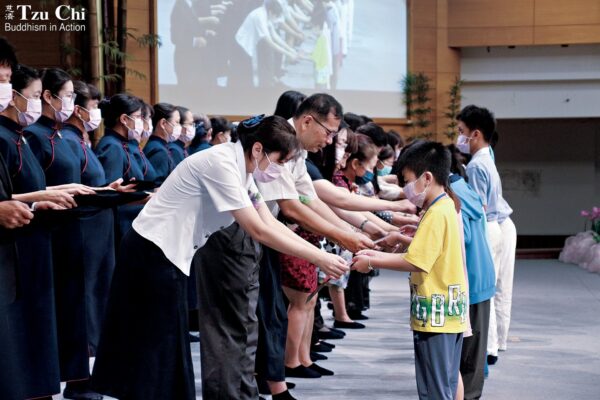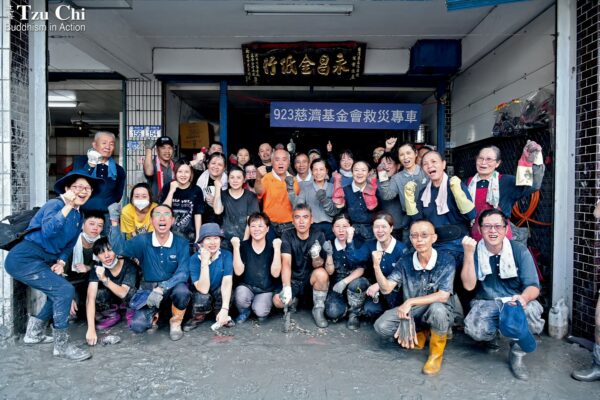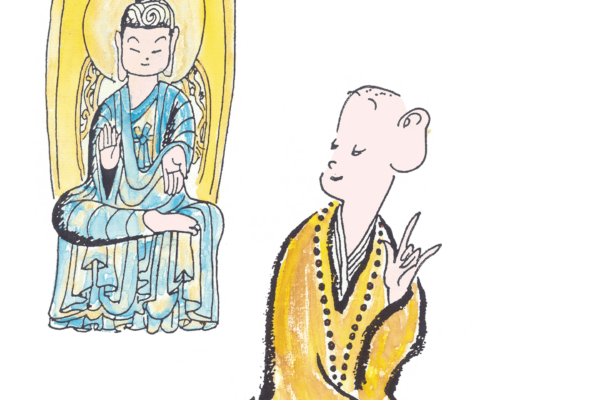Narrated by Chen Li
Compiled by Zhang Yu-fan
Abridged and translated by Wu Hsiao-ting
Photos by Huang Xiao-zhe
Though a temporary worker before she retired, volunteer Chen Li (陳麗) was able to save quite a lot of money by living frugally. Instead of leaving her money behind for her children to fight over after she passes, she decided it would be wiser to donate it to a meaningful cause while still alive.
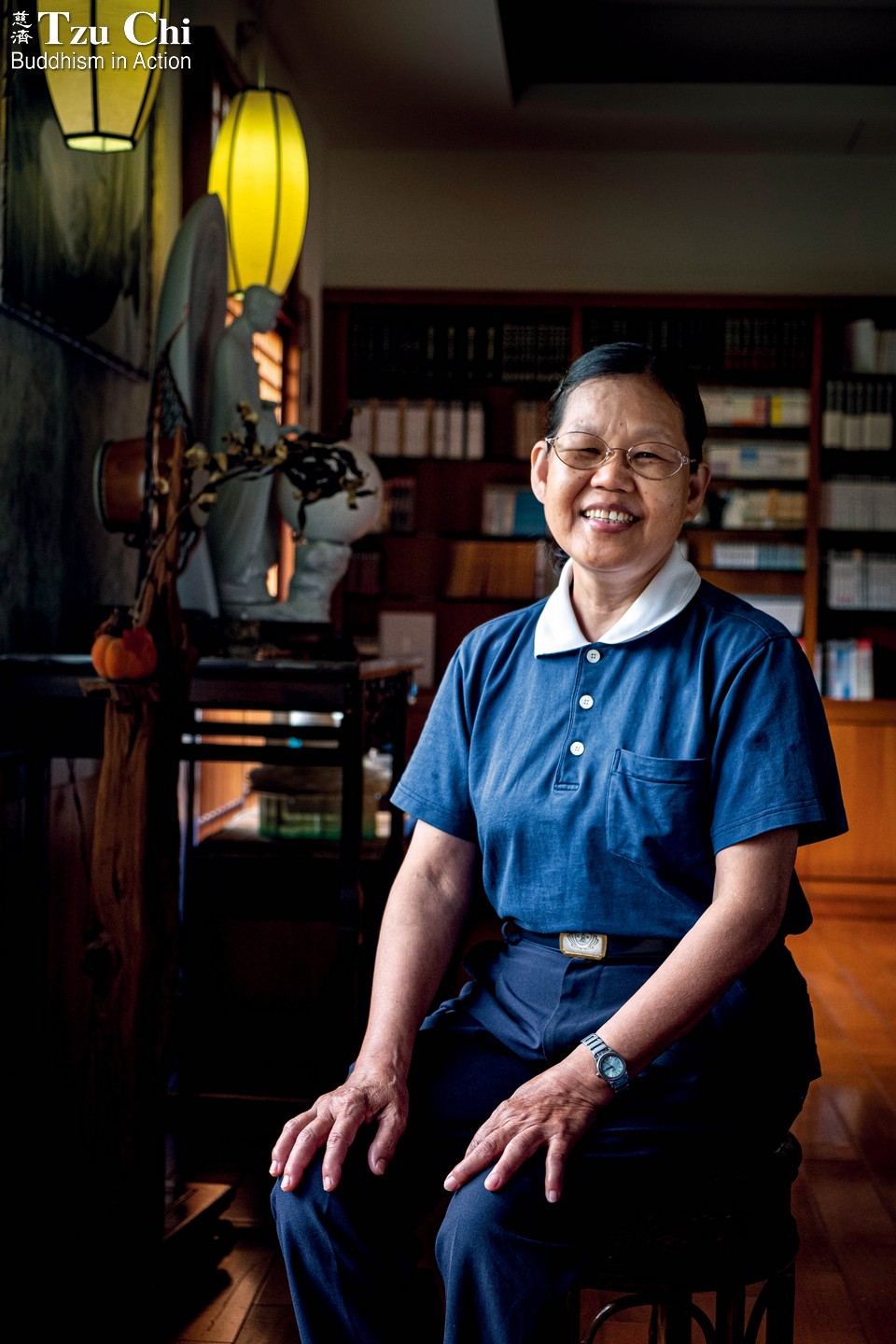
Chen Li learned from her mother how small amounts of money, when saved over time, can grow to become quite substantial.
When I was young, Mom always taught us six kids to save for a rainy day. I didn’t realize until I grew up that she pinched every penny simply because we were poor. That’s not surprising, given that most families in Taiwan were impoverished back then.
I’ve just reached my 63rd birthday. I’m the fourth oldest child in my family. I have a twin younger sister and a younger brother. The burden of supporting our large family fell completely on our dad. He didn’t have much of a formal education, and so he relied on manual labor to provide for us. It wasn’t easy supporting so many children with his hard-earned money.
Mom told me that before my twin sister and I were born, Dad left home to work as a longshoreman at Keelung Port, northern Taiwan, to put food on our table. There was no machinery at the time to help with loading and unloading ships; everything depended on human muscle power. As soon as a ship docked, Dad got busy moving goods, and he was paid when the job was done. The more goods he moved, the more he was paid. However, there was no well-established labor protection system at the time. If a longshoreman like my dad was inadvertently injured at work, he would often just apply a simple bandage before going right back to work. He might see a doctor after work—but then he alone would have to take care of the resulting medical bill.
Unfortunately, Dad began to experience health issues not long after my twin sister and I were born. We didn’t know whether it was because the work of a dockworker was too strenuous for him, or because he had suffered injuries at work and had failed to have them properly tended to. Whatever the reason, he eventually was forced to quit working at the wharf.
After Dad became ill, it became even more difficult for our family to make ends meet. Our parents had no choice but to sell the land our grandpa had left, but they didn’t get much for it. Mom often lamented later that that they had sold the land far too cheaply, but sold it was, and it was too late to regret it—they could only grind their teeth as they continued to struggle financially. My family was so destitute that my older sister had to quit school before she even made it through first grade to help take care of us at home. Our parents even considered giving my twin sister and me up for adoption, but eventually decided against it. Dad just couldn’t bear the thought of parting with us.
With money so tight, we got by almost entirely on rice porridge—the only exceptions being the first and 15th of each lunar month, when as a traditional practice we made food offerings to the deities and our ancestors. When we were done with the worship rituals, the food was ours to eat. My siblings and I were always counting the days until the next first or 15th when we could eat better. On those days, we could never eat fast enough—if you were too slow, the food would be gone before you knew it. However, we could never beat the boys when it came to eating fast. We were constantly complaining to our parents about our brothers eating too fast and too much! And yet, when I think back to those days now, I realize that though it was no fun fighting over food at the time, it was a blessing our family had a roof over our heads and that we could eat together as a complete family.
Maybe because of the difficult life we led growing up, I came to realize acutely what a terrible thing it was for a family to suffer the double whammy of illness and poverty. That’s why later in my life I constantly reminded myself to watch out for my safety and take good care of my health to avoid becoming ill.
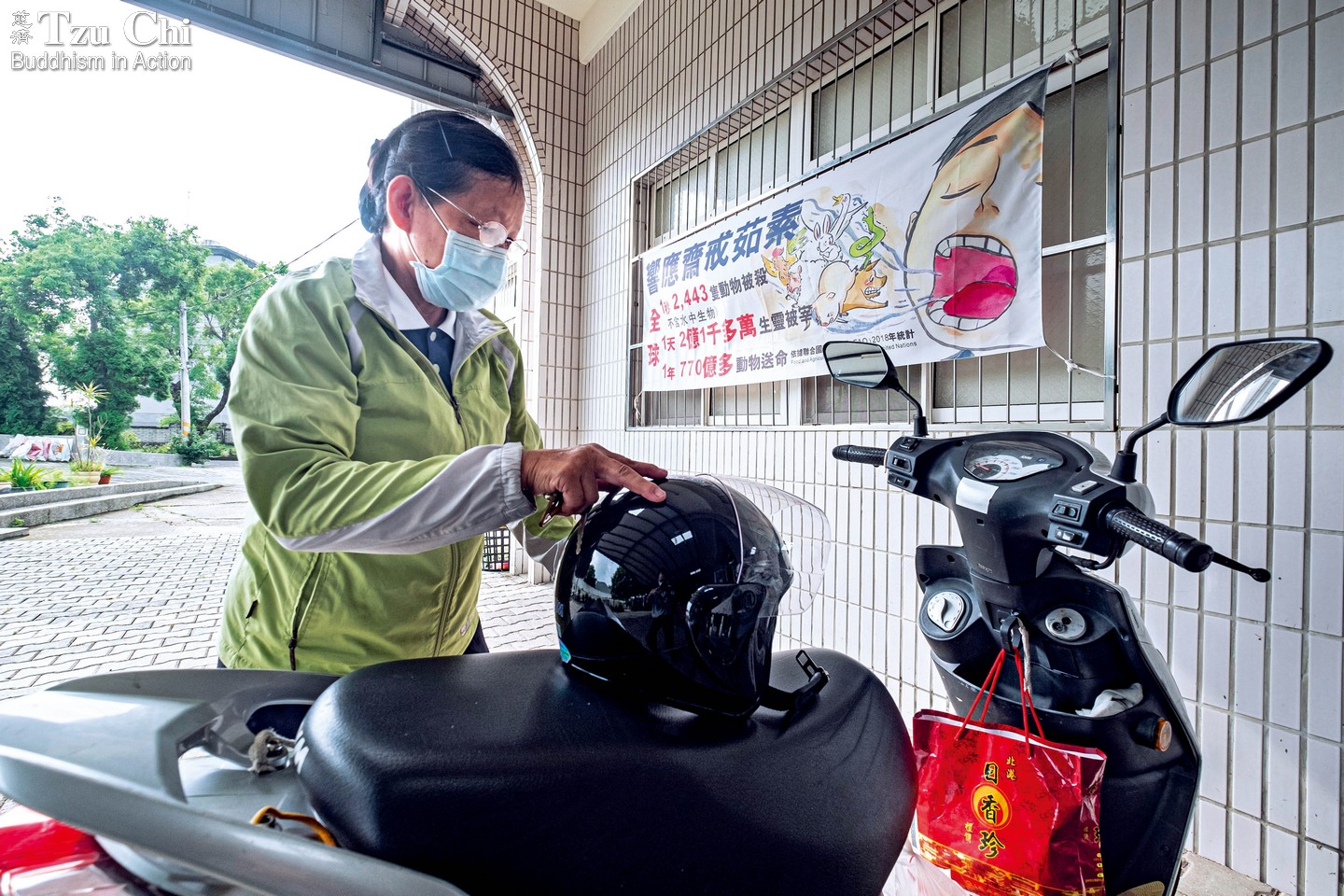
Chen is sparing with her money—except when it comes to donating it to charity. She gets around on a motor scooter, and almost everything she wears—including clothes and shoes—is from a recycling station. Even the shelves on the balcony at her home were made of discarded wooden materials salvaged from a recycling station. Bottom right photo by Wu Fang-mei
The second million
Ten years ago, I donated another million Taiwanese dollars to Tzu Chi. A decade had passed since that first million donation, and I again had some money in the bank. I decided it was a good time to make another lump sum donation.
I had been a Tzu Chi donating member for more than 20 years by that time, but I felt bad that aside from donating money to the foundation, I had done little else to help. Every time Tzu Chi needed volunteers to help with some work, I was the one with the local branch office who contributed the least. Xue-zhu often encouraged me to become a Tzu Chi commissioner, but I always told her I was too busy for that. A Tzu Chi commissioner must receive training, but I often needed to work overtime at a construction site—not only in the evenings but during the weekends too. “I simply can’t spare the time [to train and take on the role of a commissioner]!” I’d say. It wasn’t until 2011, when work opportunities began to decrease, that I agreed to begin training to become a commissioner. I received my certification two years later.
I retired two years ago, and now I finally have more time to dedicate to my volunteer work. In the meantime, I continue to live frugally. Besides volunteering at the local Tzu Chi recycling station, I like going on “treasure hunts” there. Every time I see discarded clothes that still look good and that are about my size, I take them home to wear. If need be, I make alterations so that the clothes fit me better. As a result, I haven’t needed to buy any new clothes for myself in many years.
I salvaged more than discarded clothes from the recycling station. The shelves on the balcony at my home, for example, were built of some wooden planks I found at the station. The volunteers on my team often say I’m too frugal, but I am of the opinion that if an object can still be put to use, we shouldn’t let it go to waste. I never throw away a broken item at my home if it can still be fixed, whether it be a water filter or an electric appliance. After all, prolonging the life of things is the easiest way to cut expenses and save money.
The third million
Over the past two years, Tzu Chi has donated a lot of personal protective equipment and medical devices around the world to help combat the COVID-19 pandemic. I made a mental calculation and found that another decade had passed since my second donation of a million Taiwanese dollars. So I told Xue-zhu I’d like to donate another million, my third such donation.
I was concerned that my kids might be against it if they learned about my intention to donate another million, so I kept it from them. Truth be told, I had hesitated about the donation too, until I recalled what a Tzu Chi volunteer once said about how rather than leaving money behind for our children to fight over after we pass, it’d be wiser to donate it to a good cause while we are still alive. He was right—there was good sense in his words—so I decided to go ahead and donate a third time.
When Xue-zhu asked me in whose name I would like to make my donation this time, I thought of my mother, who passed away five years ago. I suddenly missed her so much. She always taught us that if we couldn’t keep the money we earned, we’d always be short of money no matter how much we made. I’m thankful to her for helping us realize the tremendous cumulative effect of small amounts of money saved over time. Our family would definitely have had a harder struggle financially if it weren’t for her. I’m also full of gratitude to her for bringing us up despite all the hard work involved, and for giving me such a healthy body that I have never had to spend money on medical needs. As a way to thank her, I decided to donate my third million in her name.
I didn’t earn much as a temporary worker at construction sites, but for more than 30 years I never stopped working, and so, coupled with my frugality, I was able to save some money. When I was done with a stint of work at a construction site, I moved on to another. And in winter, when construction work wasn’t so plentiful, I worked in a factory that made cotton quilts. I never missed an opportunity to make money. Because I earned every penny I donated, my husband never voiced any objection about my donations.
Many fellow volunteers say it is amazing that I willingly donate so much of my hard-earned money, but I never think much of it. Instead, I feel blessed I have the ability to give. Life has treated me well: I’ve never encountered any major setbacks, my husband and children have had good health, and I have even been able to save some money on the side and make donations to help the needy. I hope I can continue to give of my time, talent, and treasure in the future.
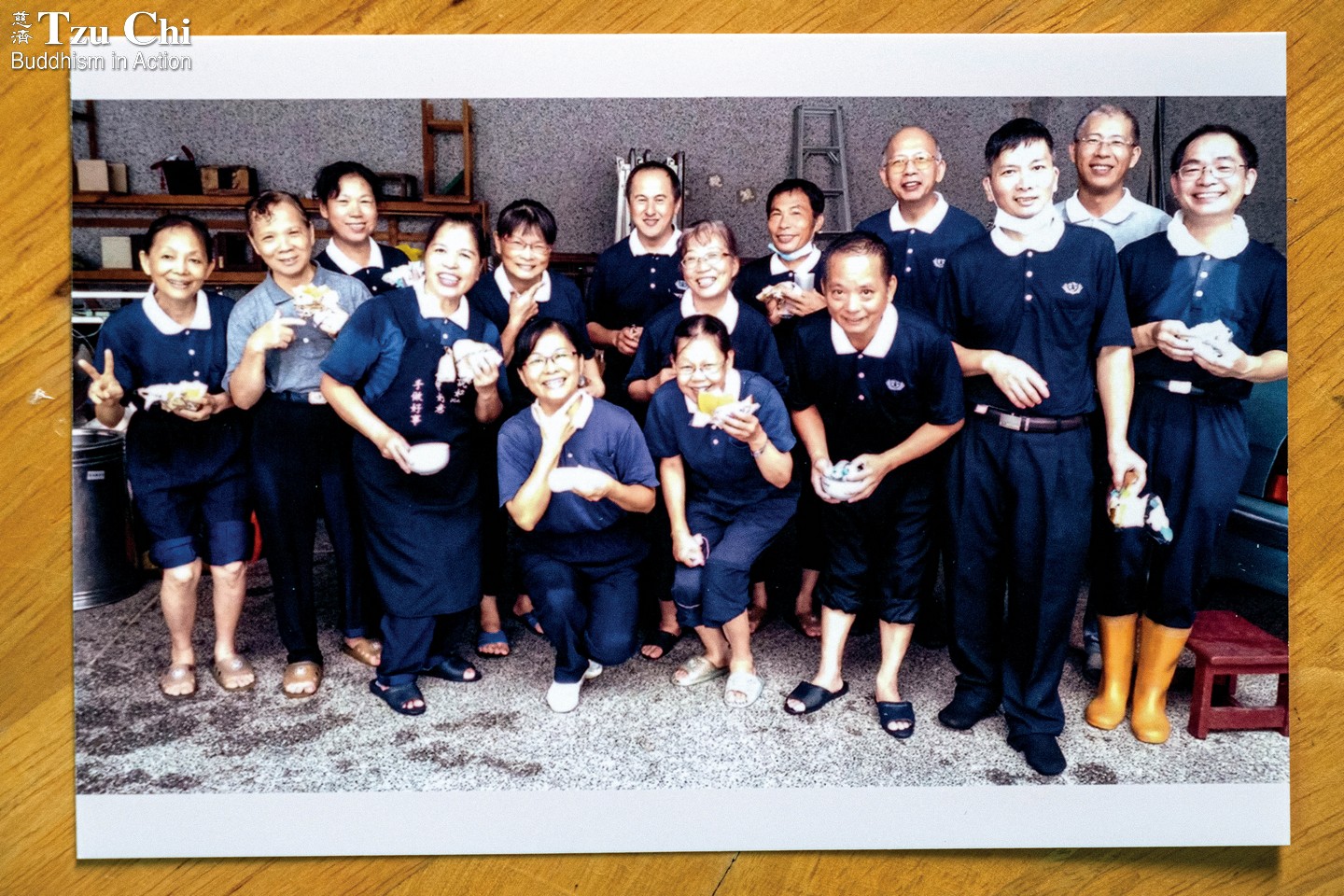
Chen (front line, middle) poses with fellow volunteers during snack time after tidying up a Tzu Chi facility. Courtesy of Chen Li
Tzu Chi Malaysia’s “Kita1Keluarga” COVID Relief Program
The Malaysian government implemented a Movement Control Order in March 2020 to curb the spread of the coronavirus. Its impact on the nation was significant and wide-ranging. To help families struggling through this difficult time, the Tzu Chi Kuala Lumpur and Selangor branch launched a COVID-19 relief program in July 2020.
Malaysia is a multi-ethnic country. The program’s name, “Kita1Keluarga,” came from Malay, meaning “we are one family.” Tzu Chi helped 2,178 families in Kuala Lumpur, Selangor, and Putrajaya under the program, from September to November 2020, providing them with short-term cash aid. Tzu Chi later launched other aid projects in response to changing COVID circumstances, including providing electronic devices for remote learning and distributing food to needy families.
In the second half of 2021, 580,000 middle-income families in Malaysia were plunged into low-income status. Tzu Chi responded by initiating “Kita1Keluarga 2.0.” In addition to calling on applicants’ homes, volunteers took the initiative to visit over 260 schools and, with the help of teachers, located more families in need of help. The distribution of aid was completed this February, benefiting 2,012 households.

